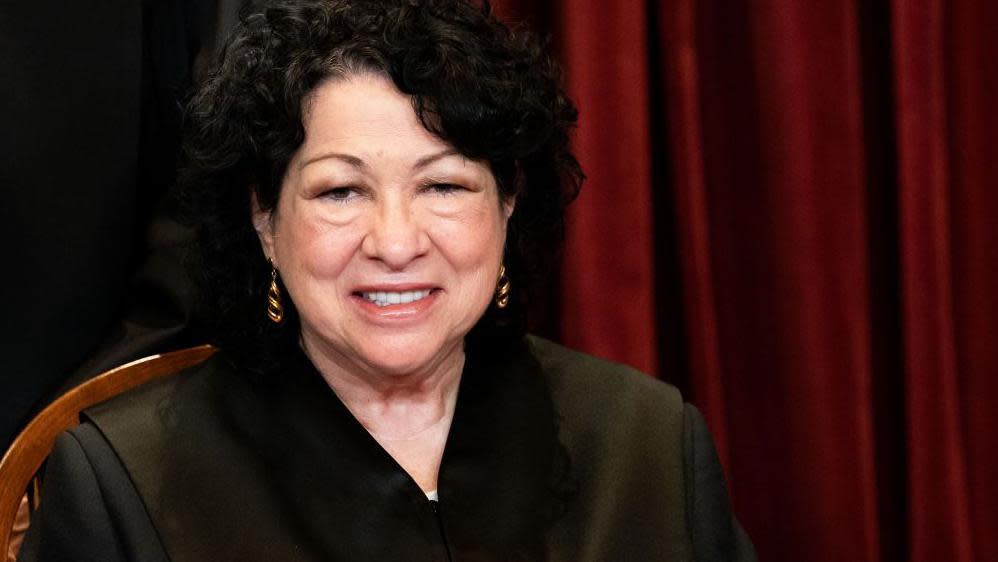Justice's dissent: 'The president is now a king above the law'

Three justices have issued a blistering dissent to the US Supreme Court opinion granting Donald Trump partial immunity from prosecution, warning that it will allow presidential power to be used "for evil ends".
The 6-3 historic decision effectively strips out key parts of an indictment against the former president for allegedly conspiring to overturn his 2020 election defeat.
Six conservative-leaning justices signed the majority opinion, but the three liberals dissented, expressing "fear for our democracy".
President Joe Biden similarly warned of a "dangerous precedent", while one legal expert said this was not simply a case of "fear-mongering".
Leading the liberals, Justice Sonia Sotomayor outlined hypothetical situations where the concept of immunity could apply.
"Orders the Navy's Seal Team 6 to assassinate a political rival?" she wrote. "Immune."
"Organizes a military coup to hold onto power? Immune. Takes a bribe in exchange for a pardon? Immune. Immune, immune, immune."
"Even if these nightmare scenarios never play out, and I pray they never do, the damage has been done," Justice Sotomayor wrote. "In every use of official power, the President is now a king above the law."
Justice Sotomayor was joined in her dissent by the court's two other liberal justices, Ketanji Brown Jackson and Elena Kagan.
Justice Jackson wrote in a separate dissent that the majority's ruling "breaks new and dangerous ground" by "discarding" the nation's long-held principle that no-one is above the law.
"That core principle has long prevented our Nation from devolving into despotism," she said.
Justice Sotomayor argued that the majority had invented a notion of absolute immunity for a president performing "official acts", even though it has at times been assumed that presidents could be prosecuted for things they did while in office.
She was visibly emotional as she spent more than 20 minutes reading out parts of her opinion on Monday.
She cited Richard Nixon getting pardoned by the president who succeeded him, Gerald Ford, for using his official powers to obstruct an investigation into the Watergate burglary - the scandal that eventually led to Mr Nixon's resignation.
Those involved in the case were under the presumption that Mr Nixon did not have immunity and could be prosecuted after leaving office, Justice Sotomayor wrote.
Her opinion went much further back in history as well. She quoted US Founding Father Alexander Hamilton, who wrote that former presidents would be "liable to prosecution and punishment in the ordinary course of law".
But the majority opinion, written by Chief Justice John Roberts, argued that the dissenters "strike a tone of chilling doom that is wholly disproportionate to what the Court actually does today".
He wrote that the liberal justices were "fear mongering on the basis of extreme hypotheticals" and dismissed their legal reasoning as weak.
Normally, court dissents include the word “respectfully” but Ms Sotomayor signed off hers by writing: “With fear for our democracy, I dissent.”
And Ms Sotomayor’s dissent was echoed by President Biden’s campaign manager, Quentin Fulks, in a call with reporters.
"Immune, immune, immune. They just handed Donald Trump keys to a dictatorship," Mr Fulks said.
Legal experts indicated that the scenarios laid out by the justices, as stark as they might seem, are open to further interpretation, particularly by lower courts.
Jeffrey Cohen, an associate professor at Boston College Law School, told the BBC that the opinion lacks clarity as to what counts as an official act.
“There’s language in there that suggests that official acts could bleed into unofficial acts really easily and render things presumptively immune,” he said. “It’s a problem that the court has left us all with this sinking feeling that they’re presuming almost everything is immune.”
Leah Litman, a law professor at the University of Michigan, said that on significant government procedure cases such as this one, the Supreme Court has usually come to a unanimous verdict, but failed to do so this time.
The decision, she said, “strongly places the thumb on the scale in favour of immunity.”
“I don’t think the dissent is being fear-mongering. At the minimum, it is unclear how a prosecution could proceed on several of the theories laid out in the majority opinion.”
Julie Novkov, the dean of Rockefeller College of Public Affairs and Policy at the University at Albany, said she was surprised at the broad definition of official acts.
But she noted that the decision raises complicated factual questions.
“I could imagine scenarios were we would have to get into this really careful analysis,” she added.
With reporting by Bernd Debusmann Jr at the Supreme Court and Rachel Looker in Washington


